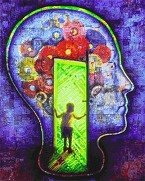Hysteria
Hysteria - Conversion - Dissociation
Hysteria is a condition in which you show psychological stress in physical ways. Today Hysteria is known as Conversion Disorder or Dissociative Disorder. It usually appears suddenly after a stressful event and help keep difficult or painful memories at bay.
To know more about Hysteria Click Here
For example, a woman may develop a paralysis of the right arm during a quarrel with a drunken husband, even though she is not hurt. The symptoms are REAL. People with conversion disorder are not putting on an act. They REALLY experience the symptoms even though there does not appear to be any apparent underlying physical cause.
Conversion disorder is nearly always triggered by a stressful event, a home environment that is otherwise frightening or highly unpredictable, or an emotional conflict that result in painful memories. It is an unhealthy way for the mind to cope with the traumatic memories.
Signs and symptoms of conversion disorder typically affect your movement or your senses, such as the ability to walk, swallow, see or hear. Conversion disorder symptoms can be severe, but for most people, they get better within a few weeks.
Treatment will depend on particular signs and symptoms and may include psychotherapy, treating related stress and other conditions, and sedative or anti-anxiety medication. Some reports have shown that people with conversion disorder may benefit from Brain Stimulation

Symptoms:
Conversion disorder symptoms usually appear suddenly after a stressful event. Common symptoms can include:
- Inability to speak
- Difficulty swallowing or “a lump in the throat”
- Possession (by a divine entity or dead person)
- Paralysis in an arm or leg
- Seizures or convulsions
- Numbness or loss of the touch sensation
- Inability to feel pain
- Memory loss (amnesia) of certain time periods, events and people
- Difficulty with walking
- Poor coordination or balance
- Impaired vision, including double vision and blindness
- Deafness
- Mental health problems, including depression and anxiety
- A sense of being detached from yourself (depersonalization)
- A perception of the people and things around you as distorted and unreal (derealization)
- A blurred sense of identity
